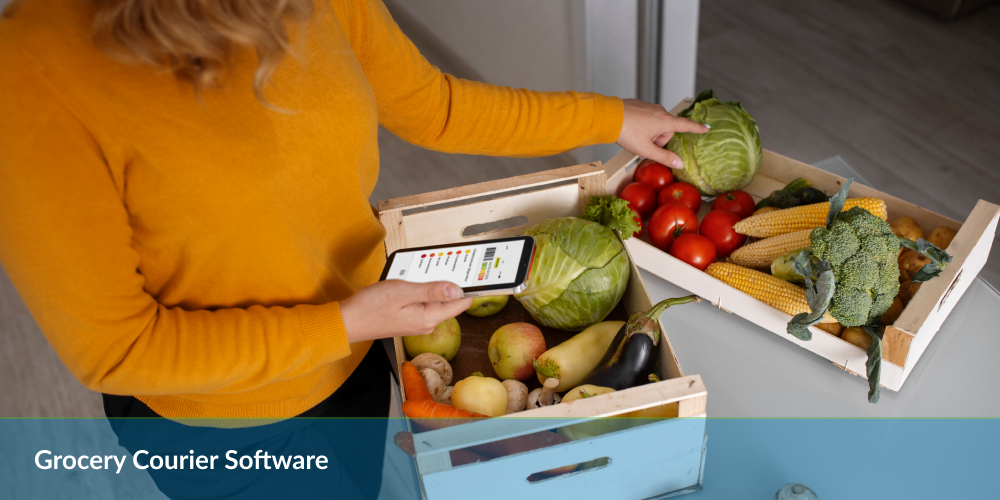Table of Contents
In today’s fast-paced business environment, grocery pickup services are convenient for individual consumers and have become a vital tool for businesses. Tailored specifically to meet the needs of companies, these services allow businesses to order groceries and essential supplies online and pick them up at a designated location, saving valuable time and resources. Whether it’s a restaurant needing fresh produce daily, an office stocking up on snacks and beverages, or a small business requiring bulk items, grocery pickup services offer a streamlined solution.

The importance of grocery pickup services in the B2B landscape is steadily growing. With businesses striving to operate more efficiently and minimize downtime, the ability to quickly and easily procure necessary supplies is crucial. These services reduce the need for traditional bulk ordering, which often leads to excess inventory and waste, and instead provide a more flexible, on-demand approach.
Key benefits of adopting grocery pickup services for businesses include significant time savings, cost efficiency, and maintaining better inventory control. Businesses can also avoid the hassles of delivery delays and out-of-stock issues by collecting their orders at a time that suits them. This growing trend is reshaping how businesses manage their supply chains, making grocery pickup services an essential part of modern business operations.
The Evolution of Grocery Procurement in Business
Traditionally, businesses relied on bulk ordering to manage their grocery procurement needs. While effective in ensuring a steady supply of goods, this method often led to challenges such as overstocking, storage issues, and increased costs due to the need for larger inventory spaces. Businesses had to forecast their needs well in advance, sometimes resulting in a surplus of perishable items or shortages that could disrupt operations.
However, as businesses started seeking more efficient ways to manage their supply chains, they began transitioning from bulk ordering to on-demand grocery services. This shift was driven by the need for greater flexibility, reduced waste, and the ability to respond quickly to changing demands. Instead of placing large orders that might take days or weeks to arrive, businesses can now order what they need and pick it up the same day or within a few hours. This just-in-time approach helps companies keep their inventory lean, reducing storage costs and minimizing the risk of spoilage.
The impact of digital transformation on business supply chains cannot be overstated. With the advent of e-commerce platforms, mobile apps, and advanced logistics systems, businesses can manage their grocery procurement processes with unprecedented ease and precision. Digital tools allow for better order tracking, more accurate forecasting, and the ability to quickly adapt to market changes. This transformation has made grocery pickup services not only more accessible but also more reliable, enabling businesses to focus on their core operations while ensuring that their supply needs are met efficiently.
Pro Tip: Switch to on-demand grocery services to minimize waste and storage costs. Use digital tools for accurate forecasting and agile supply management.
How Grocery Pickup Services Operate for Businesses
Grocery pickup services offer businesses a convenient and efficient way to manage their supply needs. Here’s a step-by-step look at how these services typically operate for businesses:
- Account Setup: Businesses must create a corporate account with their chosen grocery pickup service provider. This account allows them to manage orders, track spending, and access any available discounts or special deals. Many providers offer specialized accounts for businesses, enabling them to handle multiple locations or departments under a single account.
- Placing an Order: Once the account is set up, businesses can browse the provider’s online platform to select the needed items. Whether office supplies, fresh produce, or bulk items, the process is straightforward. Most platforms allow users to save frequently ordered items or create shopping lists to speed up ordering.
- Integration with Corporate Accounts: For businesses that regularly order in bulk, these services often integrate seamlessly with corporate purchasing systems. This integration ensures that orders are placed efficiently and that spending is tracked against budgets or expense accounts.
- Scheduling a Pickup: Businesses select a convenient pickup time after placing the order. Many services offer same-day pickup, making getting supplies quickly without interrupting business operations easy. The pickup location is usually a designated area at a local grocery store or warehouse, where staff will load the order directly into the business’s vehicle.
- Order Collection: At the scheduled time, a representative from the business arrives at the pickup location. The process is designed to be quick and hassle-free, with staff ready to assist. Businesses typically receive a confirmation that the order is complete and ready for pickup, ensuring no surprises.
- Billing and Payment: The order is billed directly to the corporate account, streamlining the payment process. Detailed invoices are often provided, which helps businesses keep track of their expenses and manage their budgets effectively.
Advantages of Grocery Pickup Services for Businesses
Grocery pickup services offer a range of advantages that make them an attractive option for businesses of all sizes. Here are some of the key benefits:
- Cost Savings and Bulk Discounts: One of the most significant advantages of grocery pickup services for businesses is the potential for cost savings. Many providers offer bulk discounts, allowing businesses to purchase larger quantities of goods at lower prices. This can lead to significant savings over time, especially for businesses that require regular supplies. Additionally, by picking up the orders, businesses can avoid delivery fees, further reducing costs.
- Time Efficiency and Resource Management: Grocery pickup services are designed to save businesses time. Instead of sending employees to shop in-store, businesses can place orders online and pick them up at a scheduled time, often within the same day. This streamlined process allows businesses to focus on their core activities rather than spending time on procurement. It also frees up staff resources, as employees can no longer handle grocery shopping tasks.
- Enhanced Inventory Control and Reduction of Waste: By using grocery pickup services, businesses can better manage their inventory. The ability to order on-demand means that businesses can maintain leaner inventories, reducing the risk of overstocking and waste. This is particularly important for perishable goods, where excess inventory can lead to spoilage. With more accurate ordering and the ability to adjust purchases based on current needs, businesses can optimize inventory management and reduce waste.
- Flexibility and Scalability for Various Business Sizes: Grocery pickup services offer flexibility and scalability, making them suitable for businesses of all sizes. Whether a small office needs weekly supplies or a large restaurant requires daily fresh produce, these services can be scaled to meet the business’s needs. The ability to adjust orders quickly in response to changing demands allows businesses to remain agile and responsive, ensuring they have the right supplies at the right time without overcommitting to large bulk orders.
Overall, grocery pickup services provide businesses with a modern, efficient, and cost-effective way to manage their supply needs, contributing to smoother operations and better financial management.
Pro Tip: Leverage grocery pickup services to save on bulk purchases and reduce waste by ordering only what you need. This approach helps optimize inventory management and cuts costs effectively.
Challenges Businesses Face with Grocery Pickup Services
While grocery pickup services offer numerous benefits for businesses, they also come with their own set of challenges:
- Scheduling and Availability Issues: One of the main challenges businesses face with grocery pickup services is coordinating pickup times that align with their schedules. Popular pickup slots can fill up quickly, especially during peak hours or busy times of the year. This can lead to delays or difficulties in securing a convenient pickup time. For businesses with tight schedules or urgent needs, finding an available slot that meets their requirements can be a frustrating experience.
- Order Accuracy and Managing Substitutions: Ensuring that orders are accurate is another common challenge. While most grocery pickup services strive for precision, mistakes can occur. Items might be missing, incorrect, or substituted with alternatives that do not meet the business’s needs. Managing these substitutions and ensuring that the final order aligns with expectations requires effective communication with the service provider. Businesses may need to allocate additional time and resources to address and rectify any issues with order accuracy.
- Logistics Challenges in Coordinating Multiple Locations: Coordinating grocery pickups can become complex for businesses with multiple locations. Each location may have different needs, and managing pickups across various sites requires careful planning and organization. Ensuring that each location receives the correct items at the right time can be challenging, especially if there is a need for more centralized oversight or communication between locations.
- Potential Fees and Hidden Costs for Bulk Orders: While grocery pickup services can offer cost savings, additional fees may be associated with bulk orders. Some providers charge extra for handling large quantities, delivery, or pickup, which can negate some of the cost benefits. Businesses must be aware of potential hidden costs and factor these into their budgeting and procurement strategies.
Best Practices for Implementing Grocery Pickup Services in Business
To effectively implement grocery pickup services, businesses should consider the following best practices:
- Tips for Choosing the Right Service Provider: Selecting the right grocery pickup service provider is crucial. Businesses should evaluate providers based on reliability, availability, cost, and product range. Choosing a provider with a strong reputation for customer service and order accuracy is also beneficial. Comparing different providers and reading reviews can help businesses make informed decisions that align with their needs.
- How to Streamline Ordering Processes and Communication: Streamlining the ordering process and communication is essential for efficient grocery pickup management. Businesses should establish clear procedures for placing orders, including who is responsible for ordering and how orders are tracked. Utilizing features such as saved shopping lists or recurring orders can simplify the process. Effective communication with the service provider, including promptly addressing any issues or order changes, helps ensure smooth operations.
- Strategies for Maximizing Discounts and Loyalty Programs: To maximize cost savings, businesses should take advantage of discounts and loyalty programs offered by grocery pickup services. Many providers offer bulk discounts, promotional deals, or rewards programs for frequent users. Businesses should actively seek out these opportunities and incorporate them into their procurement strategy. Additionally, negotiating terms and conditions with providers can help secure better pricing and terms.
- Ensuring Seamless Integration with Existing Supply Chains: For grocery pickup services to be effective, they must integrate smoothly with existing supply chain processes. This involves coordinating pickups with inventory management systems and ensuring the service provider meets the business’s requirements. Businesses should work closely with their service provider to align pickup schedules, manage inventory levels, and address logistical challenges. Seamless integration helps maintain efficiency and ensures that the grocery pickup service complements the overall supply chain strategy.
By addressing these challenges and following best practices, businesses can optimize their use of grocery pickup services, enhancing efficiency and contributing to overall operational success.
The Future of Grocery Pickup Services in Business
1. Emerging Trends in B2B Grocery Services
The grocery pickup service landscape is evolving rapidly, with emerging trends shaping its future. One significant trend is the growth of personalized services tailored specifically for businesses. Providers are increasingly offering customized solutions that address the unique needs of different industries, from food service to corporate offices.
2. Potential Technological Advancements
Technological advancements are expected to play a crucial role in the future of grocery pickup services. Innovations such as artificial intelligence (AI) and automation are set to enhance the efficiency of order fulfillment and inventory management. AI-powered systems can predict demand more accurately, reducing waste and improving stock availability. Automation in warehouses and pickup locations will streamline processes, making pickups faster and more efficient.
3. Expansion into New Industries and Business Sectors
Grocery pickup services are also expanding into new industries and business sectors. For example, there is growing interest in applying these services to sectors such as healthcare and education, where timely and accurate supply delivery is critical. As businesses recognize the benefits of grocery pickup services, their adoption across various sectors will likely increase, further integrating these services into the broader business ecosystem.
Key Takeaways
Enhanced Efficiency and Cost Savings: Grocery pickup services provide businesses with a convenient way to manage their supply needs, saving time and reducing costs. Businesses can achieve significant financial savings by eliminating delivery fees and taking advantage of bulk discounts.
Improved Inventory Control: These services enable businesses to maintain lean inventories, reducing the risk of overstocking and waste. On-demand ordering helps minimize spoilage, especially for perishable goods, leading to better inventory management.
Flexibility and Scalability: Grocery pickup services are highly adaptable, catering to businesses of all sizes. They offer the flexibility to adjust orders based on changing needs, making them suitable for everything from small offices to large restaurants.
Digital Transformation and Technological Integration: Adopting e-commerce platforms and mobile apps has revolutionized grocery procurement for businesses, allowing for seamless integration with existing supply chains. This digital transformation enhances order tracking, forecasting, and overall operational efficiency.
Challenges and Best Practices: While grocery pickup services offer numerous benefits, businesses must navigate scheduling issues, order accuracy, and potential hidden costs. Choosing the right provider, streamlining processes, and leveraging discounts are crucial for maximizing these services’ benefits.
Conclusion
Grocery pickup services have become an invaluable asset for modern businesses, offering a range of benefits that enhance efficiency and streamline operations. Providing a convenient and cost-effective way to manage supply needs, these services help businesses save time, reduce costs, and improve inventory control. The ability to quickly and easily pick up essential items on demand means that companies can maintain lean inventories, minimize waste, and focus more on their core activities.
The growing adoption of grocery pickup services reflects their increasing importance in business. From restaurants to corporate offices, businesses across various sectors are reaping the rewards of these services, making them a crucial component of effective supply chain management.
For businesses considering grocery pickup services, choosing a reliable provider, streamlining ordering processes, and leveraging discounts and loyalty programs are essential. Embracing these best practices can maximize the benefits and ensure a seamless integration with existing operations.
Discover how NetworkON can help your business leverage grocery pickup services to boost operational efficiency and streamline your supply chain. Explore our solutions today to stay ahead in the competitive market.
Frequently Asked Questions
What are grocery pickup services, and how do they benefit businesses?
Grocery pickup services allow businesses to order groceries and essential supplies online and pick them up at a designated location. These services offer several benefits for businesses, including significant time savings, cost efficiency through bulk discounts, enhanced inventory control, and reduced waste. By utilizing grocery pickup services, businesses can streamline their procurement processes, avoid delivery delays, and maintain better inventory management.
How do grocery pickup services work for businesses?
Grocery pickup services typically involve a few straightforward steps:
Account Setup: Businesses create a corporate account with a grocery pickup service provider, which allows them to manage orders and track spending.
Placing an Order: Businesses browse the provider’s online platform to select needed items and place orders.
Scheduling a Pickup: After placing an order, businesses select a convenient pickup time, often on the same day.
Order Collection: A business representative collects the order at the scheduled pickup time from a designated location.
Billing and Payment: The order is billed directly to the corporate account, simplifying the payment process.
What challenges do businesses face with grocery pickup services?
While grocery pickup services offer many advantages, businesses may encounter several challenges, including:
Scheduling and Availability Issues: Securing a convenient pickup time can be difficult during peak hours or busy seasons.
Order Accuracy and Substitutions: Ensuring orders are accurate and managing substitutions can require additional time and resources.
Logistics for Multiple Locations: Coordinating pickups for businesses with multiple locations can be complex.
Potential Fees and Hidden Costs: Some providers may charge extra fees for bulk orders or pickups, which could impact overall cost savings.
What are the best practices for businesses using grocery pickup services?
To effectively implement grocery pickup services, businesses should consider the following best practices:
Choose the Right Service Provider: Evaluate providers based on reliability, cost, availability, and product range. Opt for those with strong customer service and order accuracy.
Streamline Ordering and Communication: Establish clear procedures for placing orders and utilize features like saved shopping lists for efficiency.
Maximize Discounts and Loyalty Programs: To save costs, take advantage of bulk discounts, promotional deals, and rewards programs.
Ensure Seamless Integration: Work closely with service providers to align grocery pickups with existing supply chain processes and maintain efficiency.





0 Conversations